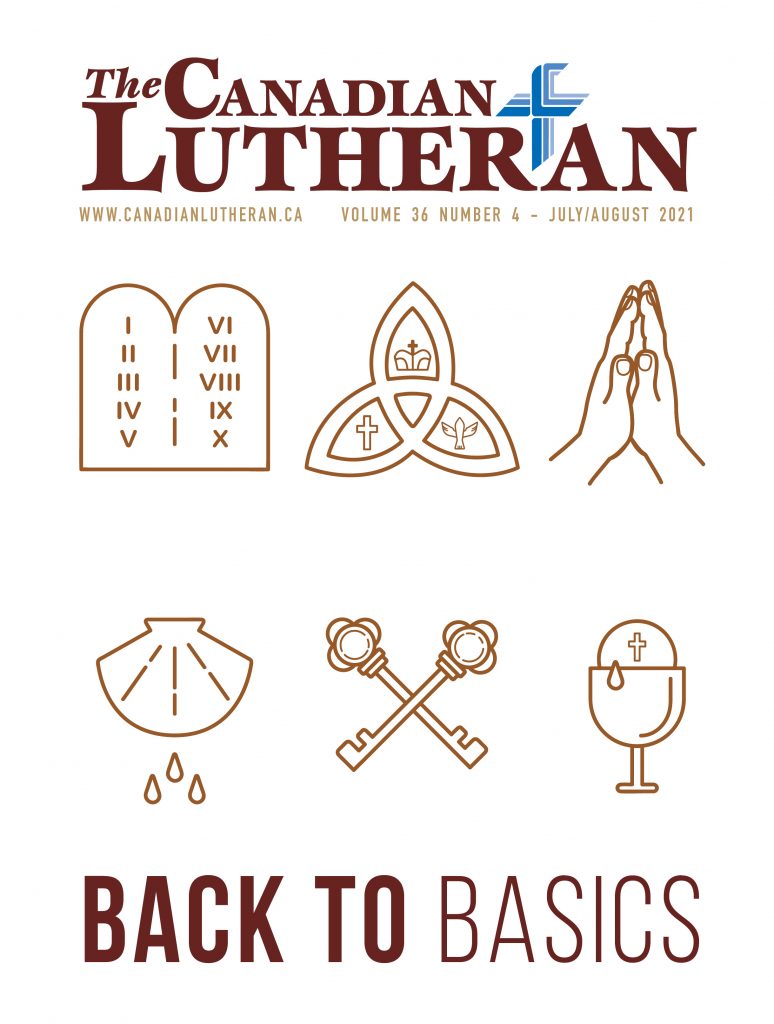Back to Basics
 by Mathew Block
by Mathew Block
My wife and I have recently been planning out the next school year for our kids, and reflecting on how we will integrate Luther’s Small Catechism into our children’s education. As I look through the catechism again—with eyes towards instructing someone else in it rather than just learning myself—I’m struck anew by how simple and yet profound the book is.
When was the last time you read your catechism? I don’t say this to shame you. My own catechism too often sits on the shelf unopened. In our churches, there is a danger that we treat the Small Catechism as something we read once and then graduate from—something we study for confirmation and then leave behind.
That’s a real shame because the catechism is a theological and devotional treasure. We might even consider it a sort of Coles Notes to the Bible, as it helps us synthesize key teachings of the Scriptures in a way easy for children (and adults!) to understand and use in daily life.
We begin with the Ten Commandments, the Law which shows us the lives God calls us to lead—the lives which we have failed to lead. Aware of our sin, we turn to the Good News of the Gospel recorded in the Apostles’ Creed. We learn of the Father who created us, the Son who has redeemed us from sin through His death and resurrection, and the Holy Spirit who has called us to faith.
In this issue, we’re going back to basics. We’re reaffirming foundational aspects of Christian faith and life, asking God to rekindle our love and desire for the great gifts He freely gives.
We live out that faith daily through the petitions of the Lord’s Prayer, asking God to protect us in every need of body and soul. And then we turn then to the Sacraments, the places where God’s grace touches our lives in real—even tangible—ways. We remember our entrance into the Church through Holy Baptism, the forgiveness of sins we receive through regular Confession and Absolution, and the enlivening of our faith received through the Body and Blood of Christ.

These teachings are so elementary—so basic—to the faith, that even children can understand them. But therein lies the danger: because a child can understand them we may treat them as if they were childish. These things are so basic that we can begin to overlook them in favour of “deeper” truths.
But while our understanding of Christian faith may mature over time, these doctrines are not things we grow out of. Do we outgrow our need for air to breath? Do we outgrow our need for food or drink? By no means! These things remain fundamental to life; without them, we die.
The same is true spiritually. Without the fellowship of believers, without God’s Word, without the Sacraments, faith first grows stunted and then declines. Like the seed with little root, we wither away. Like the house without a solid foundation, we are swept off and lost in the storms of life.
There are many dangers in this world: bodily dangers like COVID-19, yes, but also spiritual dangers posed by the devil, the world, and our own sinful inclinations. “I walk in danger all the way,” the hymnwriter Hans Adolf Brorson writes (LSB 716). And indeed we do. “I pass through trials all the way.” “Death pursues me all the way.”
They are topics you’ve studied before. But like the Catechism—like the Gospel itself—it’s something we need to return to again and again. May God bless us as we do.
But God has not left us to face these dangers alone. He gives us the Church to walk with us. He gives us His Word to lead and comfort us. He gives us the Holy Sacraments to strengthen us. When we see how great the peril is in which we live, when we see how great our need and how great the gifts our Saviour offers us, then we will run to the house of God freely and willingly.
For this reason, Luther writes in the preface to the Small Catechism, there is no need to compel Christians to come to church. If we explain the danger clearly and articulate plainly the salvation offered week in and week out in the life of the congregation, then believers will come of their own accord. Of the Lord’s Supper specifically, Luther writes that a Christian will come “running in a hurry to the Lord’s Table”—compelled not by outward forces but by his own sense of need, “constrained within himself and pressing [the pastor] to give him the Sacrament.”
In this issue, we’re going back to basics. We’re reaffirming foundational aspects of Christian faith and life, asking God to rekindle our love and desire for the great gifts He freely gives. Rev. Dr. John Hellwege asks us what the essential service of the Church is and why we as Christians need it. Rev. Ling Pui Yeong reflects on the nourishment we get from the Word of God. And Rev. Warren Hamp calls us “back to the Supper”—to the gifts God wishes to give us in the Holy Sacraments.
They are topics you’ve studied before. But like the Catechism—like the Gospel itself—it’s something we need to return to again and again. May God bless us as we do.
———————
Mathew Block is Editor of The Canadian Lutheran and Communications Manager for the International Lutheran Council (ILC).





